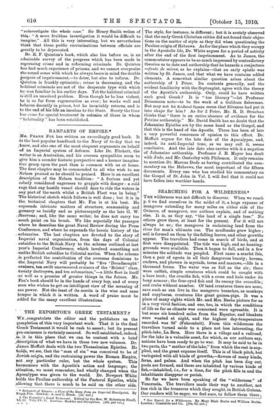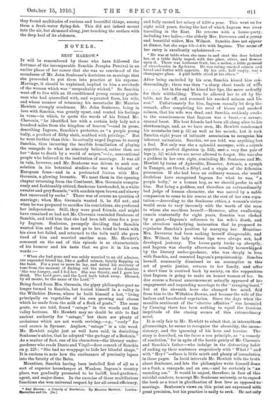SEARCHING FOR A 'WILDERNESS.*
T HE wilderness was not difficult to discover. When we reach p. 6 we find ourselves in the midst of it, a huge expanse of mangrove extending for many miles on either side of the Orinoco, of mangrove, our authors explain, and of nothing else. It is, as they say, "the land of a single tree." No others grow there, at least for the present. For it will not always be so ; the mangrove is reclaiming land from the river for man's ultimate use. The mudbanks grow higher ; soil is formed on them by the falling leaves, and other growths appear. The travellers had come in search of birds, and at first were disappointed. The tide was high, and no hunting. grounds were available. Then it began to fall, and in a few minutes the solitude was peopled. First came a scarlet ibis, then a pair of egrets in all their dangerous beauty; herons, curlews, and plovers in myriads, terns and macaws,—life in a thousand forms. The water was as full as the air; there were catfish, simple creatures which could be caught with a bare hook; the crucifix fish, with a cross and halo under its bony armour; the four-eyed fish and its enemy the crocodile ; and crabs without number. Of land creatures there are none, save such as can live in the mangrove branches, AS monkeys and capybaras, creatures like giant guinea-pigs. It was a place of many sights which Mr. and Mrs. Beebe picture for us in a very vivid fashion, and one, too, in. which the conditions of life as far as climate was concerned were agreeable. It is but some six hundred miles from the Equator, and blankets were wanted at night, and the highest day-temperature recorded. was 86° (Fahrenheit). From this wilderness the travellers turned aside to a place not less interesting, the pitch-lake,,La Brea. Here there is a village and a railroad; for the lake is a valuable asset, for which, as our authors say, nations have been ready to go to war. It may be said to be in two parts, the "mother of the lake," from which thereat is sup, plied, and, the great expanse itself. This is of black pitch, but variegated with all kinds of growths,—flowers of many kinds, ferns, and palms. And when the pitch has been dug out, pools are formed, and these are inhabited by various kinds of fish,—inhabited, i.e., for a time, for the pitch fills in and the inhabitants disappear or perish.
So far we have been speaking of the "wilderness" of Venezuela.. The travellers made their way to another, not less rich in the treasures which they sought, in British Guiana. Our readers will be eager, we feel sure, to follow them there ;
• Our $tarch for a Wilderness. By Mary Blair Beebe and William Beebe4 London; 0:instable and Co. L102. 64. net."I
they found multitudes of curious and beautiful things, among them a fresh-water flying-fish. This did not indeed mount into the air, but skimmed along, just touching the surface with the deep keel of its abdomen.















































 Previous page
Previous page